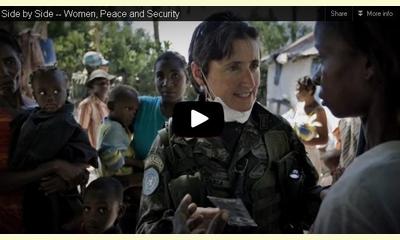|
|
New Film for the United Nations on Women, Peace and Security
un article par Janet Hudgins
Video: Side by Side: Women, Peace and Security
This came to me today and I thought it was particularly pertinent to the Women's Equality section of CPNN. The video is really good but seems to be best with MP4.

click on photo to enlarge
The Peace Operations Training Institute (POTI) is pleased to announce the free worldwide availability of two e-learning courses through a generous grant from the Australian Government. Implementation of Security Council resolution (SCR) 1325 (2000) in Africa; and Implementation of SCR 1325 (2000) in Latin America and the Caribbean were both developed by the United Nations Entity for Gender Equality and the Empowerment of Women (UN Women) and POTI. SCR 1325 (2000), unanimously adopted in October 2000, sets out a policy framework for women and peace and security.
These courses introduce the main principles of the resolution and provide practical guidelines on how to implement it at the national level, including through the development of national action plans. Students who enroll in either of these courses will also be directed to view the video, Side By Side: Women, Peace and Security which was funded by the Australian Government and UN Women.
The Peace Operations Training Institute is a 501(c)(3) public charity based in the United States of America. We are an independent not-for-profit organization governed by our Board of Directors. Our courses and programmes have been repeatedly welcomed by the United Nations Special Committee on Peacekeeping Operations.
The Peace Operations Training Institute is dedicated to providing globally accessible and affordable distance-learning courses on peace support, humanitarian relief, and security operations to men and women working to promote peace worldwide. Students have been taking our distance-learning courses on UN peacekeeping since 1995.
We have the most experience providing distance training in peacekeeping. Our alumni serve in the interest of peace all over the world. They are peacekeepers in the field at Missions, academics teaching the next generation, diplomats, high-ranking officials, and others. Thousands of students from over 170 nations have expanded their knowledge with the Peace Operations Training Institute.
The self-paced, downloadable format of our courses allows the study of peacekeeping topics from anywhere in the world at any time. Our curriculum fulfils many training needs, including preparing for deployment to a peacekeeping mission, increasing effectiveness in the field, complementing study in the classroom, and increasing insight and knowledge of the UN system.
|








|
DISCUSSION
Question(s) liée(s) à cet article:
UN Resolution 1325, does it make a difference?,
* * * * *
Commentaire le plus récent:
A recent study by the NGO Working Group on Women, Peace and Security is critical of the UN Security Council for its inconsistent implement of Resolution 1325 that calls for an increased role of women in peacekeeping and peacebuilding. The full report is available on the Internet on the website of womenpeacesecurity.org.
The working group members are an impressive group of active international NGOs: Amnesty International; Consortium on Gender, Security and Human Rights; Femmes Africa Solidarité; Global Action to Prevent War; Global Justice Center; Human Rights Watch; The Institute for Inclusive Security; International Action Network on Small Arms; International Alert; International Rescue Committee; Refugees International; International Women’s Program of the Open Society Foundations; Social Science Research Council; Women’s Refugee Commission; Women’s Action for New Directions; Women’s International League for Peace and Freedom.
Here is the report's Summary of Findings
General trends in the Council over the last 12 years have shown significant development, including in the language and expertise on women, peace and security in resolutions, more expertise available to deploy in terms of gender advisors and women, peace and security, and a more sophisticated understanding of the key issues at the root of this agenda. There is a better understanding of, for example, what it takes to have disarmament, demobilization, and reintegration processes that are responsive to women; security sector reform that is responsive to women; and post-conflict elections that support women candidates and women voter. However, there is inconsistency in the Council’s deployment of that knowledge. There is still a significant disconnect between the content of reports received by the Council, meetings the Council holds, and resolutions it adopts.
There have been a number of positive developments in the Council’s use of women, peace and security-specific language in its policy over the last year. For the first time, for example, the Council used women, peace and security language in its resolution on Cyprus. However, there have also been inconsistencies. The Council’s initial lack of support for women in September 2011’s resolution on Libya was rectified by strong support in its March 2012 renewal. . ... continuation.

|
|









